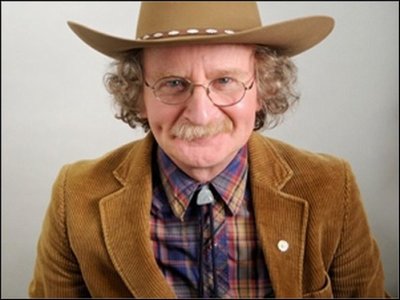April 1, 2010
It’s lonely on the right – but sometimes the rewards can be sweet
The circle of conservative and libertarian academic historians in the United States is so small that they all know each other. They talk to each other on a listserv, they go to the same conferences, they’re funded by the same right-wing foundations and think tanks.
And for many years, they complained that all the sophomore-level textbooks on American history suffered from a liberal bias, recalled Professor Mike Allen, one of UW Tacoma’s founding faculty members.
“There was not one conservative textbook,” Allen said during a recent interview in his faculty office — where Republican Barry Goldwater (1964) and Libertarian Ed Clark (1980) gazed down from campaign posters on the walls, attesting to Allen’s well-known political stance.
Conservative historians particularly disliked the late Howard Zinn’s 2003 book, A People’s History of the United States, which is often assigned reading in college classrooms, much to the vexation of said conservatives. Allen said Zinn was a “millionaire Marxist” and calls A People’s History “a terrible book.”
“It’s not scholarly,” he charged. “It doesn’t even have footnotes.”
So Allen teamed up with Larry Schweikart, a prolific history professor at the University of Dayton, and they set out to right the wrong — so to speak. The two collaborated on an American history textbook, A Patriot’s History of the United States: From Columbus’s Great Discovery to the War on Terror, told from their perspective.
Allen said he and Schweikart aren’t hard-headed about their views; they acknowledge that there are points in American history that have been negative. “But we don’t believe our country is always wrong, either,” he said. “This is a good place.” Allen said their book tells “the remarkable story of the American experiment, which by and large, is a great success.”
“Zinn always saw the glass as half empty,” Allen added. “My view is that it is two-thirds full.”
Patriot’s was planned to be a college textbook, but when Sentinel Trade, a conservative imprint of Penguin Group, bought the publishing rights, it evolved into a scholarly trade book for the general market.
The first press run of 70,000 copies, which coincided with the 2004 re-election of President George W. Bush, was “relatively successful,” Allen said. It reached number 38 on Amazon.com’s bestseller list and sold 50,000 or 60,000 copies. A 2007 revised edition continued to do well. Allen’s four other books, including Rodeo Cowboys in the North American Imagination, have probably sold about 5,000 copies all together, he estimated. Patriot’s was definitely his most financially successful book, so he was pleased with it.
Then, something amazing happened.
This February, conservative talk show host Glenn Beck interviewed Schweikart — the more publicly outgoing of the two authors — on his television show. As he was leaving the studio, Schweikart handed Beck a copy of Patriot’s. A few days later, Beck began talking about the book during his show.
Patriot’s started to rise on Amazon.com’s bestseller list. Beck kept talking about it, and it kept rising. Within two weeks, it was Amazon’s number-one bestseller.
Allen was stunned, thrilled and validated, all at the same time. A man of modest means and taste, he started telling people he could finally afford to have some dental work done.
A month later, the book appeared on the NY Times’ bestseller list for paperback nonfiction, landing at number 17 with a bullet. Allen started thinking about putting a new roof on his house.
A week after that, Patriot’s reached number one on the NY Times’ paperback nonfiction list and stayed there for two weeks. Today it is number two in paperback nonfiction with an asterisk, which means the book’s sales are barely distinguishable from those of the book above. On Amazon, it’s now number 25.
Eagerly awaiting his royalty check so he can pay off his 2007 Chevy pick-up, Allen said he is now “hypothetically well off.” He’s looking forward to buying a little travel trailer and puttering around the Mississippi River Valley, researching a book that he’s always wanted to write.
Allen didn’t know how many copies of Patriot’s had sold, but he noted that 380,000 have now been printed. Those are mostly paperbacks. If you want a hardback copy, you’re out of luck. Allen said he only has one and, when asked, he wouldn’t part with it. At the time this article was written, there was one hardcover copy on eBay, asking price $131, and on another website, a first-edition hardcover in fine condition for $220.
Although he’s pleased with the book’s financial success and possible spin-off projects, Allen is enjoying the view from the top for a change. “This is a delicious situation for a libertarian to be in,” he said.
The political pendulum, Allen expects, will swing back the other way. When it does, maybe he will be ready to make some waves with that Mississippi River Valley book.



